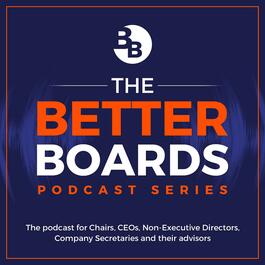
Cutting past the noise on the climate/energy transition | David Harris, Sustainable Finance Strategic Initiatives, London Stock Exchange Group
Send us a text Over the last decade, climate and sustainability have become more of a focus for boards and sub-committees. However, there is currently a lot of conflicting noise around this agenda. So, there is a lot for boards to digest around this topic, making it an opportune time to take stock of where we are and what boards should consider. In this podcast, Dr. Sabine Dembkowski, Founder and Managing Partner of Better Boards, discusses climate/energy transition with David Harris, who has worked on these topics for over 20 years. He leads sustainable finance strategic initiatives at LSEG (London Stock Exchange Group), having previously led sustainable finance for two of its divisions: FTSE Russell in its index business, and its Data and Analytics division. “20 years ago, this was regarded as quite a niche area. Today, that picture is completely different. It"s one of the top issues for institutional investors.” The data backs him up. In FTSE Russell’s annual survey of global pension funds, they ask if the funds are integrating sustainability issues into their investment strategies. Among the largest and most sophisticated funds, those with over 10 billion dollars in assets under management, 86 per cent do. “Of the different sustainability themes, climate change and energy transition rank in our asset owner survey as being the very top priority.” Data from the International Energy Agency shows in 2024, annual investment into the energy sector was $3 trillion, $2 that in 2024, annual investment in the energy sector was $3 trillion, $2 trillion in clean energy, and $1 trillion in fossil fuels. In contrast, around five years ago, they were roughly on par at $1 trillion each. So, David says we are well into a substantial shift in the global economy, and boards and investors need to understand that. “I think there has been some surprise.. from boards at the level of reporting requirements coming at them.” Shifts of this magnitude come with many reporting requirements – requirements that have many boards less than thrilled. Some of the exasperation is at the newness of the requirements, and some is frustration with the scope. David feels this is a legitimate concern, as many boards find that keeping up with reporting can detract from focusing on the most material and relevant issues of running the business. “What"s really important here is… sustainability standards are increasingly being set in a way which aligns them with the way companies are used to reporting on financial information.” The International Financial Reporting Standards (IFRS) Foundation has set up the International Sustainability Standards Board, which may be familiar to many listeners. It aims to get global sustainability standards set up in a way that aligns with how companies are used to reporting on financial information and in a format that’s easier for the investor community to use. The three top takeaways for effective boards from our conversation are: 1. Don"t get lost in all of the reporting regulations. Cut through that and focus on the material issues and what’s right for the business. 2. Remember to subscribe and never miss an episode of the Better Boards Podcast Series. It’s available on Apple, Spotify, or Google. To find out how you can participate in the Better Boards Podcast Series or for more information on Better Boards’ solutions, please email us at info@better-boards.com.
From "The Better Boards Podcast Series"


Comments
Add comment Feedback